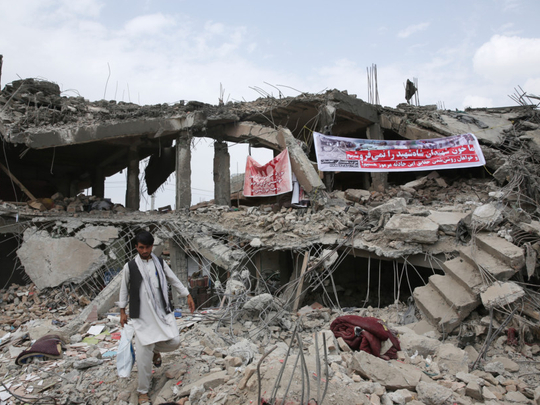
The recent wave of violent terrorist attacks in Kabul that took the lives of dozens of innocent civilians with huge material losses may be considered a game-changer, as President Ashraf Gani said at a press conference on August 10. The incidents have triggered strong reactions from Afghans across the country questioning the peace process facilitated and hosted by Pakistan last month. The negotiations had raised hopes that the first ever face-to-face meeting with the Taliban might be the beginning of a breakthrough. I wrote in a Gulf News column dated July 30 that the talks were historic and could eventually pave the way for lasting peace in the region. Yet, I had indicated that we have to be cautiously optimistic and should not expect too much due to the unpredictable nature of the stakeholders in the process.
Ever since taking office last September, Gani has been keen to reach some kind of political settlement with the insurgents. Yet the brutal attacks of the past few days must have made Gani think twice before going any further on the talks without strong commitment from Pakistan. Unlike his predecessor, the incumbent president has been more straightforward and pragmatic. So far, he has reached out to the Pakistani political and military establishments with all sincerity and vision only to find another wave of cold blooded murder of innocents at the hand of the Taliban, who have hide-outs inside Pakistan. Pakistan is alleged to be the major mastermind of the political and military strategy of the insurgents although with some limitations. The weakness of the Afghan government is the lack of clear knowledge about the magnitude of influence the Pakistani establishment has on the Taliban and other militant groups, and the complexity of the relationship.
Gani termed the incident of last Friday as a turning point for Afghan-Pakistani relations with implications for the coming 40 years. The Afghan president wants his neighbouring country to make a clear choice between genuine efforts for peace or no peace at all in order for his country to go for other options. He has already declared that Afghanistan must make peace with Pakistan before doing so with the Taliban. His strongly-worded statement the other day further emphasises the notion.
The recent disclosure of the news of Taliban supreme leader Mullah Omar’s death back in 2013 was an important development in the insurgency. If the motive of the current wave of attacks is that the new Taliban leader Mullah Akhtar Mansour wants to assert his authority among Taliban militants, it makes no sense. It was in fact Mullah Mansour that sent his delegation for talks rather than Mullah Omar, as he did not exist, having passed away in 2013. Any further attacks will only pave the way for virtual derailment of the long-awaited peace process, which is neither in the interest of Pakistan nor Afghanistan.
In response to President Gani’s speech and blasting Pakistan for the attacks, Prime Minister Nawaz Sharif was quick to respond. He made the classic Pakistani statement that his country is against terrorist attacks in Afghanistan. The Afghan’s stance is loud and clear: ‘Enough is enough, we want action not words.’ The loss of innocent lives across the Durand Line is nothing for Afghans to celebrate either. Yet, it is the architects of the misguided perception of regional geopolitics to be blamed.
If Pakistan still wants to save the peace dialogue, it must use its full influence on the Taliban and Haqqani networks to stop all kinds of militant operations inside Afghanistan. Yet, if the idea is to keep the Afghan government busy in false promises of peace without genuine commitment, Pakistan is then playing a dangerous game with its own people as extremism knows no boundaries. The ball is now in Pakistan’s court.
Ajmal Shams is President of the Afghanistan Social Democratic Party better known as Afghan Millat National Progressive Party and is based in Kabul, Afghanistan. . He served as Policy Advisor to Ashraf Gani, the Afghan President, when he chaired the security transition commission. He mainly writes on political and developmental issues. You can follow him on Twitter at www.twitter.com/@ajmshams











